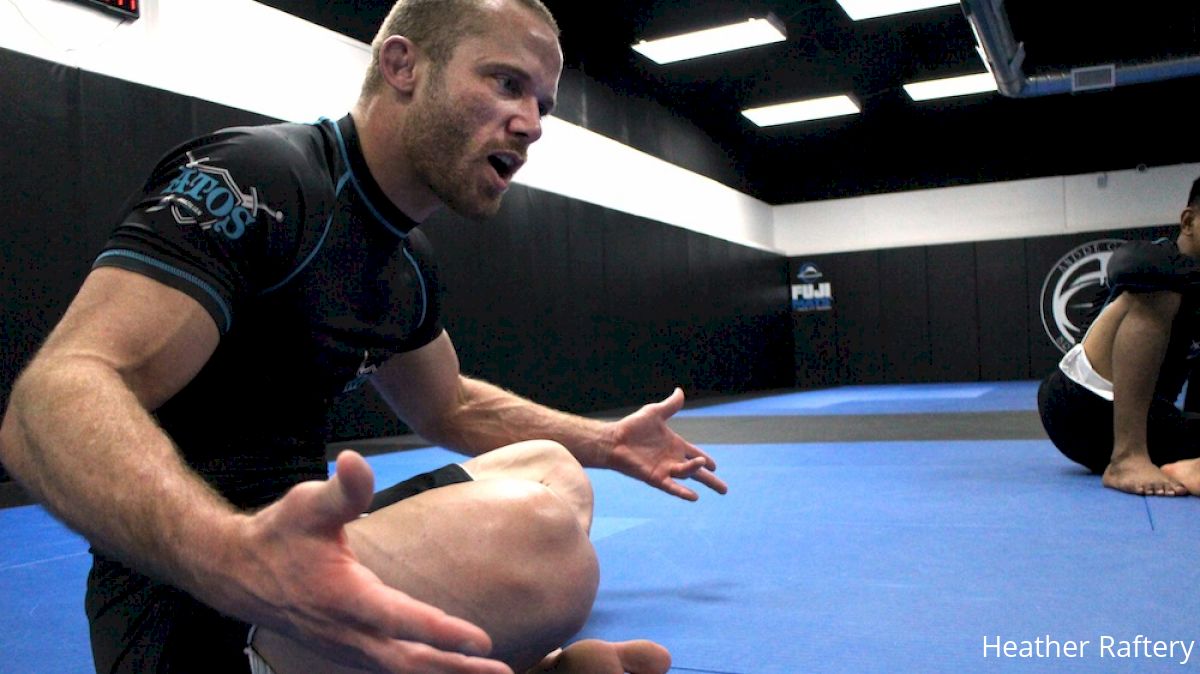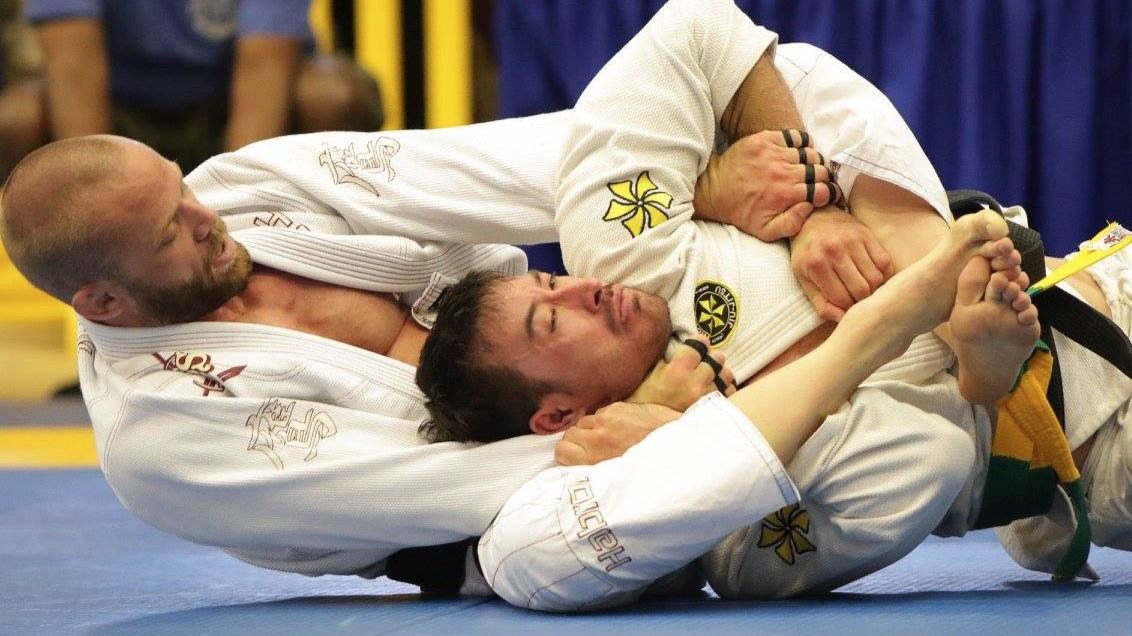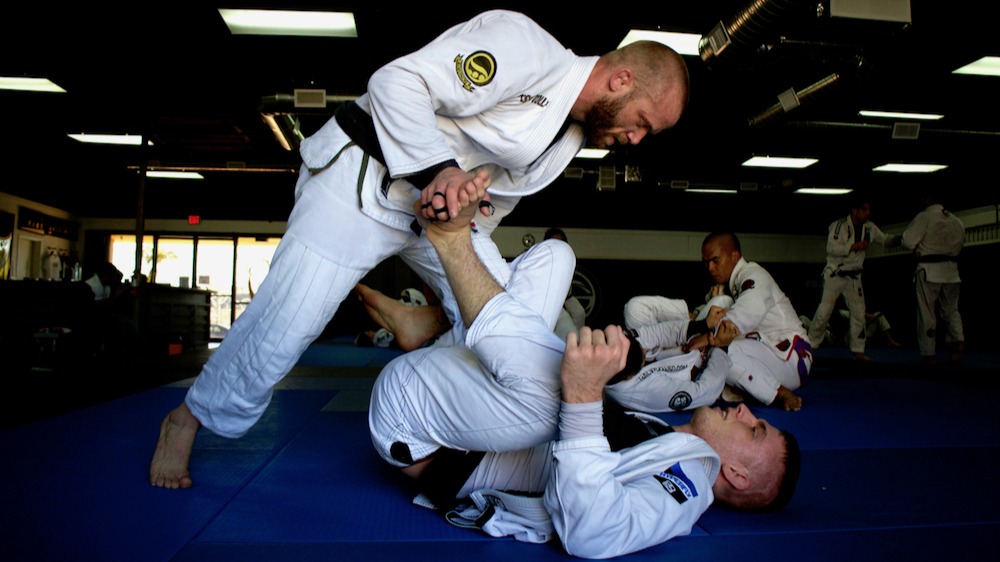Rivalries In Jiu-Jitsu: The Good, The Bad, And The Absurd
Rivalries In Jiu-Jitsu: The Good, The Bad, And The Absurd
Josh Hinger is an IBJJF 2016 black belt no-gi world champion representing Atos Jiu-Jitsu. He writes for FloGrappling about the importance of rivalries on jiu-jitsu -- both in competition and in training.

It seems professional jiu-jitsu these days is full of rivalries -- both friendly and bitter.
I think for the most part, the term rival is used to represent a negative sentiment between two closely skilled competitors in the same field of competition. However, the definition of the term does not necessarily imply the negative emotions or feelings as we might often perceive when discussing rivalries.
A rival is simply a competitor with whom you have crossed paths on several occasions. It is a person who likely has the same goal as you -- to be the best jiu-jitsu competitor that they can be.
In the IBJJF brown and black belt competition circuit, it is quiet common to cross paths with the same active competitors. Over the course of a year or two, someone might compete with the same opponent three or four times. And in all likelihood, both opponents have won and lost against each other.

Hinger gets the choke at the IBJJF San Diego Open. Photo: IBJJF
Now does this mean they need to be bitter toward each other? No. Do we need to ignore them when we walk past them? No. Or maintain cold, icy stares when looking at one another? No.
We do not need to be a group of wild dogs snarling at each other over a fleshy piece of bone or, in most cases, a gold medal. Is it beneficial for you to carry negative sentiments toward your rival opponents because they beat you on a given day? No.
Instead, be grateful for these individuals, because they are forcing you to adapt your strategy and to rise to the next occasion. They are your best motivator. They are forcing you to be the best version of yourself. Someone who has the same goals and dreams as you should never be your enemy. You can NEVER become the champion without having taken some losses. And to those individuals who have beaten you in the past, you should say, thank you.
Either way, it's all in good fun.
Being friendly does not take away from your ability to fight hard. It does not take away from your jiu-jitsu skills. Sure, I understand being focused. Just before a match and during a match is no time for jokes. But to hold your game face 4-5 hours before the match or the day before the match or even on a weekend when there is no match at all seems ridiculous to me.
I'm not saying that everyone needs to be buddy-buddy and joke around with each other, but I do think some competitors need to lighten up and stop pouring bitterness and hatred into our sport.

Josh Hinger training with Atos teammate Keenan Cornelius. Photo: Heather Raftery
Training room rivalries are a very real thing. No one can frustrate me like my teammates. They know my strengths. They know my weaknesses, and they know my general strategies. But I certainly do not avoid them because I know they will give me a tough round and quite possibly beat me into submission.
And even though I hang out with these guys, BBQ with them, and travel with them, it does not hinder me for one second from bringing 100 percent focus, effort, and determination to them when a training round begins.
There is nothing bitter about my rivalries with my teammates. I try to kill them because I want to be the best, and because I want them to be the best version of themselves. In competition, however, I just try to kill my opponents because I want to be the best. In the training room, we fight to win because we want to improve and feel good about our jiu-jitsu. In the competition, we fight to win because we want to feel good about our jiu-jitsu. We get a gold medal, and the match goes on to public record.
Unfortunately, social media has allowed competitors to fuel bitter rivalries in keyboard warrior-like fashion. In my opinion, bitterness or a general lack of politeness just exemplifies an ego that is out of control or a severe insecurity problem.
This hits home with me the hardest when I watch 8-14-year-old competitors at the kids' tournaments walking around with a bad attitude and a look of hatred on their faces as they try to intimidate their opponents. I know they are just mimicking their mentors, their parents, or the people they watch online. It's absolutely ridiculous.
However, I've always observed how the greatest athletes in the sport, the real world champions, have always had the best coaching attitudes and students who exemplify class and sportsmanship. True champions do not need to fuel negative rivalries. They are too busy focused on being a champion.
It is my hope that some of the jiu-jitsu athletes out there can put an end to their hateful, toxic bullcrap and start setting a positive example for others who hope to follow in their footsteps.
Josh Hinger is an IBJJF 2016 black belt no-gi world champion representing Atos Jiu-Jitsu. Follow him on Instagram and Facebook.
I think for the most part, the term rival is used to represent a negative sentiment between two closely skilled competitors in the same field of competition. However, the definition of the term does not necessarily imply the negative emotions or feelings as we might often perceive when discussing rivalries.
Do I need to dislike my opponent?
A rival is defined as a person or thing competing with another for the same objective or for superiority in the same field of activity.A rival is simply a competitor with whom you have crossed paths on several occasions. It is a person who likely has the same goal as you -- to be the best jiu-jitsu competitor that they can be.
In the IBJJF brown and black belt competition circuit, it is quiet common to cross paths with the same active competitors. Over the course of a year or two, someone might compete with the same opponent three or four times. And in all likelihood, both opponents have won and lost against each other.

Hinger gets the choke at the IBJJF San Diego Open. Photo: IBJJF
Now does this mean they need to be bitter toward each other? No. Do we need to ignore them when we walk past them? No. Or maintain cold, icy stares when looking at one another? No.
We do not need to be a group of wild dogs snarling at each other over a fleshy piece of bone or, in most cases, a gold medal. Is it beneficial for you to carry negative sentiments toward your rival opponents because they beat you on a given day? No.
Instead, be grateful for these individuals, because they are forcing you to adapt your strategy and to rise to the next occasion. They are your best motivator. They are forcing you to be the best version of yourself. Someone who has the same goals and dreams as you should never be your enemy. You can NEVER become the champion without having taken some losses. And to those individuals who have beaten you in the past, you should say, thank you.
Keeping rivalries good-natured
I feel that friendly rivalries are one of the best gifts that our fellow competitors can give to us. A friendly rivalry is one in which you can jokingly talk some trash to your opponent's face before the match, laugh about it, and then proceed to fight that person as hard as you possibly can. Respect is shown after the match, and once emotions have calmed, the winner and loser continue with their banter -- the winner gets bragging rights, and the loser calls the winner a cheater or a staller.Either way, it's all in good fun.
Being friendly does not take away from your ability to fight hard. It does not take away from your jiu-jitsu skills. Sure, I understand being focused. Just before a match and during a match is no time for jokes. But to hold your game face 4-5 hours before the match or the day before the match or even on a weekend when there is no match at all seems ridiculous to me.
I'm not saying that everyone needs to be buddy-buddy and joke around with each other, but I do think some competitors need to lighten up and stop pouring bitterness and hatred into our sport.

Josh Hinger training with Atos teammate Keenan Cornelius. Photo: Heather Raftery
How rivals are just like your training partners
If you compete against someone regularly, are they really that different from one of your training partners? I am willing to admit that I have more emotional engagement in my training room matches than I do in my competition matches.Training room rivalries are a very real thing. No one can frustrate me like my teammates. They know my strengths. They know my weaknesses, and they know my general strategies. But I certainly do not avoid them because I know they will give me a tough round and quite possibly beat me into submission.
And even though I hang out with these guys, BBQ with them, and travel with them, it does not hinder me for one second from bringing 100 percent focus, effort, and determination to them when a training round begins.
There is nothing bitter about my rivalries with my teammates. I try to kill them because I want to be the best, and because I want them to be the best version of themselves. In competition, however, I just try to kill my opponents because I want to be the best. In the training room, we fight to win because we want to improve and feel good about our jiu-jitsu. In the competition, we fight to win because we want to feel good about our jiu-jitsu. We get a gold medal, and the match goes on to public record.
Social media, and when rivalries become negative
The point is: if competitors can fight like hell with their teammates but still be best friends when training is over, there is really no reason to create bitter rivalries with other competitors.Unfortunately, social media has allowed competitors to fuel bitter rivalries in keyboard warrior-like fashion. In my opinion, bitterness or a general lack of politeness just exemplifies an ego that is out of control or a severe insecurity problem.
This hits home with me the hardest when I watch 8-14-year-old competitors at the kids' tournaments walking around with a bad attitude and a look of hatred on their faces as they try to intimidate their opponents. I know they are just mimicking their mentors, their parents, or the people they watch online. It's absolutely ridiculous.
However, I've always observed how the greatest athletes in the sport, the real world champions, have always had the best coaching attitudes and students who exemplify class and sportsmanship. True champions do not need to fuel negative rivalries. They are too busy focused on being a champion.
Keeping things positive
Kindness is not a sign of weakness. Instead, it is a sign of confidence and respect for one's self and for the other competitors. I've never feared the competitor who is pacing around the warm-up area like a rabid dog with an angry look on his face. I am most cautious, though, of the man who carries himself confidently, quietly, and respectfully.It is my hope that some of the jiu-jitsu athletes out there can put an end to their hateful, toxic bullcrap and start setting a positive example for others who hope to follow in their footsteps.
Josh Hinger is an IBJJF 2016 black belt no-gi world champion representing Atos Jiu-Jitsu. Follow him on Instagram and Facebook.
Liked this article? You may also enjoy...
- 'Dodgy Decisions:' But Were You Really Robbed?
- Hey, Jiu-Jitsu Competitors, Stop Apologizing For Your Losses
- The Top Player's Burden In Submission-Only Matches
- Training Camp Season: A Guide For Jiu-Jitsu Travelers & Visitors
- The Nasty Business Of Cutting Weight: Some Advice From A World Champion
- A Question Of Age: An Over 30's Perspective On Adult vs Masters Divisions
- In Defense Of Jiu-Jitsu's Most Hated Rule: The Pros and Cons of Advantages
- How to Manage Your Mind on Tournament Day
- The Brutal, Painful Reality Of Training In A World-Class Jiu-Jitsu Gym
- Beware Of The False Champions With Medals They Don't Deserve
- Are Closeouts Good or Bad For The Sport?